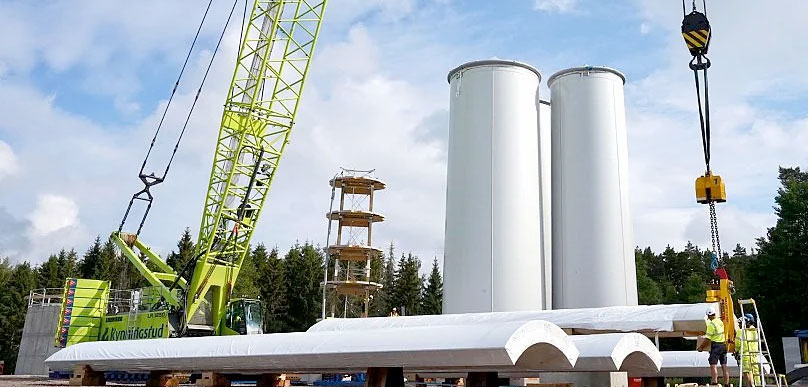Meet the Swedish start-up making clean energy even greener
Wind power is a major piece of the puzzle in decarbonising the grid. But the giant constructions usually rely on carbon-intensive materials like steel.
Swedish start-up Modvion is channelling Scandi design to combat this problem and create ‘net zero wind power’ by erecting wooden towers.
The company recently debuted the world’s tallest wooden wind turbine tower, near Gothenburg in southwest Sweden.
The 150-metre-tall construction features a 2 megawatt generator that is now supplying enough clean energy to power around 400 homes.
Is wood a good alternative to steel for wind towers?
Steel – the more common material for wind turbine towers – is favoured for its strength and durability. But as towers get ever taller, the logistics of putting them in place become more complex.
Huge pieces of metal are heavy and difficult to transport. The high steel towers require extra enforcement to carry their own weight.
Modvion’s laminated wood towers are manufactured from modules that are easy to stack onto lorries and do not need reinforcement.
With a higher strength to weight ratio, they enable lighter construction and can be assembled by a small crane before being lifted into place.
They can also be joined together with glue, rather than the thousands of bolts needed for steel towers that require regular inspection. A coat of watertight paint protects them from the elements.
Cost-wise, wooden towers work out less expensive than steel towers over time, according to Modvion. The cost advantage is greater for taller towers, and they are also shielded from the fluctuating price of steel.
So far, Modvion has only installed wooden towers on land. But with minor adaptations, it says they could also be used offshore.
In theory, wooden towers could be built as high as 1,500 metres, but current demand is closer to 150-200 metres.

How do the emissions of steel and wooden wind towers compare?
The life cycle emissions of a 110-metre-tall steel wind turbine sit at around 1,250 tonnes of CO2, according to Modvion.
This is slashed by 90 per cent – to around 125 tonnes – for a wooden tower.
When they need to be decommissioned, wooden towers can find new life as high-strength beams for the building industry, further reducing their footprint.
We like to see our towers as vertical storage of future building material,
“We like to see our towers as vertical storage of future building material,” says Modvion.
Building towers in wood lowers the emissions from wind power plants by approximately 30 per cent per kWh, they estimate.
Between 300 and 1,200 cubic metres of wood are needed per tower. The company uses Scandinavian spruce from sustainably managed forests, for which re-growth exceeds logging.
Source: Yahoo News


